
No. 44October 13, 2021
|
Sisters in Spirit Vigils and Walks
Honouring the Memory of Missing and Murdered Indigenous Women and Girls

Downtown Eastside, Vancouver
Each year since 2006, vigils have been held across Canada on October 4 to honour the memory of the more than 4,000 missing and murdered Indigenous women and girls and to demand justice and action to end the violence. This year the Native Women’s Association of Canada held its national vigil online while local walks and vigils took place in a number of cities.
The disappearances and deaths of Indigenous women and girls are part of ongoing treatment of Indigenous peoples on a racist and colonial basis which considers them to be a nuisance for whom no accounts need be rendered. The problem “isn’t really high on our radar” as former Prime Minister Stephen Harper infamously put it when he was in office, while the actions of the current federal government are similarly based on colonial considerations. Police and authorities often dismiss cases of missing and murdered Indigenous women and girls as suicides or runaways “not wanting to be found” while no action is taken on living conditions on reserves or the conditions of life in the urban centres.
The ongoing trauma is enormous. It was eloquently expressed by Bethany Stewart, a survivor of the “Millennial Scoop,” which refers to Indigenous children taken away from their communities and put into foster homes where identity loss is a foregone conclusion. Bethany spoke of her experience at a vigil of families of Sisters in Spirit held in Vincent Massey Park, on Algonquin Territory in Ottawa. She was separated from her Cree family and culture when she was scooped into the foster care system. She finally managed to reconnect with her family at the age of twelve under tragic circumstances: the trial of her mother’s murderer, held in Ottawa in 2010.
The pain of having lost her mother was compounded by the media which depicts Indigenous women in a racist manner and dishonours them. Her family had been forced to attend St. Anne’s Indian Residential School in Fort Albany in northern Ontario, notoriously brutal in terms of the sexual and physical abuse of children. She said that had her mother not been through such trauma, including having some of her children taken away from her, life would have been different and her mother would still be alive today.
A sacred fire and three candles were lit at Vincent Massey Park to honour missing and murdered women, girls and Two-Spirit people, residential school survivors and their families and children, as well as Sixties and Millennial Scoop survivors.
Similar ceremonies honouring the lives of missing and murdered Indigenous women, girls, and Two-Spirit people took place right across Canada, from coast to coast to coast. The legacy of residential schools and how it lives on for the survivors and their children was felt profoundly. The failures of government authorities to be accountable and take responsibility for the crimes committed were roundly condemned. To this day, every day, an Indigenous woman, girl or boy goes missing or is killed. The system which is constituted to perpetuate this state of affairs must be replaced with a system which affirms the rights of all and is accountable, upholds hereditary rights and establishes genuine nation-to-nation relations.
The photos below are from Sisters in Spirit vigils held in Ottawa, Hamilton, Windsor, Calgary, Lethbridge and Vancouver.
Ottawa
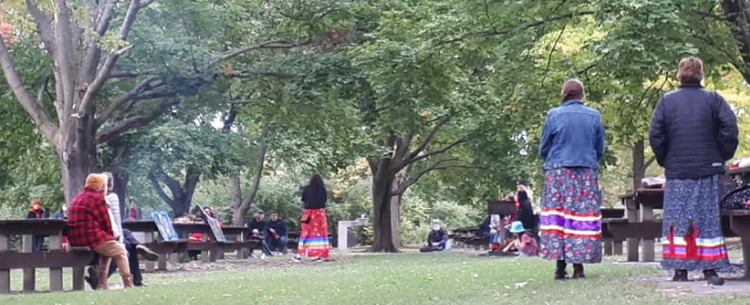
Hamilton
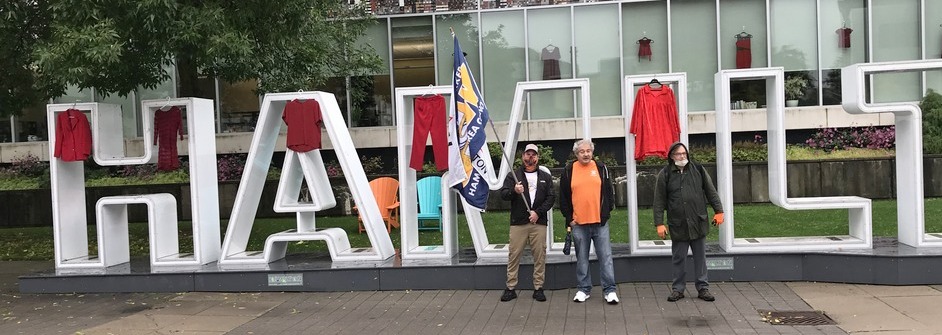
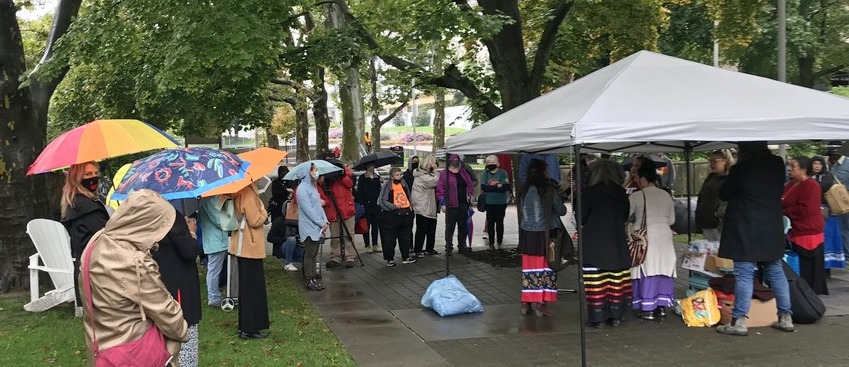
Windsor
Calgary

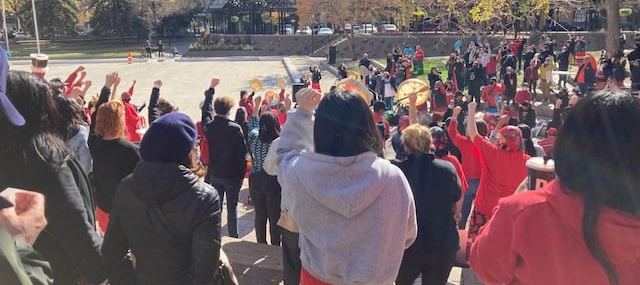
Lethbridge
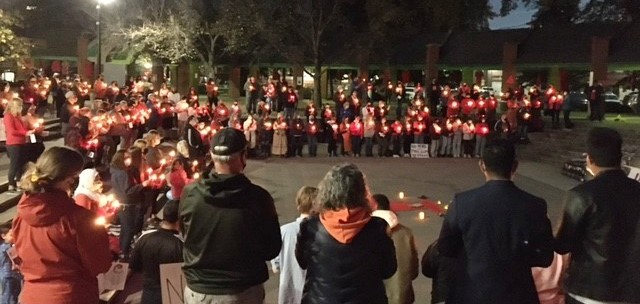
Vancouver

(Photos: RU, BWSS, Alpha House, PBI, Awo Taan Healing Lodge Society D. Day.)
St. Anne’s Indian Residential School
Catholic Church Operated, Federal Government Funded
St. Anne’s Indian Residential School, located near Fort Albany in northern Ontario, operated from 1902 to 1976. The school was run by the Oblates of Mary Immaculate, a Catholic Order, with funding from the federal government. Cree children from Fort Albany First Nation and Indigenous children from the surrounding area were sent to St. Anne’s during this time. The so-called school left a legacy of emotional, physical, sexual, mental, and spiritual abuse for the survivors, their families, and their children.
In the early 1990s, the Ontario Provincial Police (OPP), prompted by recollections of a group of residential school survivors, commenced an investigation into St. Anne’s. The investigation, which concluded in 1996 and uncovered a voluminous collection of documentary evidence, highlighted the pervasive and systematic nature of the abuse of students at the school. Seven former staff members were ultimately charged with criminal offences.
In 2000, over 150 former students launched civil proceedings in connection with their mistreatment at St. Anne’s. Six years later, before any of the St. Anne’s claims could be resolved, Canada and a multitude of other parties negotiated the Indian Residential Schools Settlement Agreement (better known as the “IRSSA”). The IRSSA was signed on May 8, 2006, and received court approvals across Canada between December 2006 and January 2007.
The IRSSA set out a framework for resolving “all claims arising from or in relation to an Indian Residential School or the operation of Indian Residential Schools of the Class Members,” including those who had attended St. Anne’s and whose previous civil claims had never proceeded to trial.
The hearing of one of the components of this framework, the Independent Assessment Process (IAP) for claims of sexual and serious physical abuse, commenced in 2007. Despite the volumes of evidence uncovered by the OPP investigation, Canada did not disclose the contents of the OPP documents, nor even their existence, to the individuals bringing IAP claims. As a result, many St. Anne’s survivors had to re-establish the abuse that they had suffered. Others, without the support of those documents, may have been unable to establish the abuse altogether.
As it turned out, Canada had obtained copies of the OPP documents back in 2003 to defend against the original claims brought by the St. Anne’s survivors, but only acknowledged this fact in June 2013, in response to repeated inquiries from applicants’ lawyers. The documents remained housed at the Department of Justice offices in Toronto the entire time.
In the end, the Court ordered that Canada disclose the OPP documents in its possession, including transcripts concerning incidents of abuse at St. Anne’s. Despite the court order, Canada continued to impede meaningful access to the OPP documents.
In 2015, the applicants brought a second challenge in relation to the OPP documents, claiming that Canada had failed to update properly its narrative and person-of-interest (POI) reports for St. Anne’s, had heavily redacted the documents that it did provide, and had otherwise failed to disclose the documents in a way that would permit their meaningful use by applicants and IAP adjudicators.
Regarding the government’s endless fighting with the claimants, one lawyer involved in the proceedings put it this way: “It’s always the most complicated, convoluted interpretation that Canada can come up with that mysteriously ends up leaving the victims of physical and sexual abuse without a remedy.”
To see full account, click here.
30th Annual Take Back the Night March in Prince George
Calls to End all Forms of Violence Against Women and Children
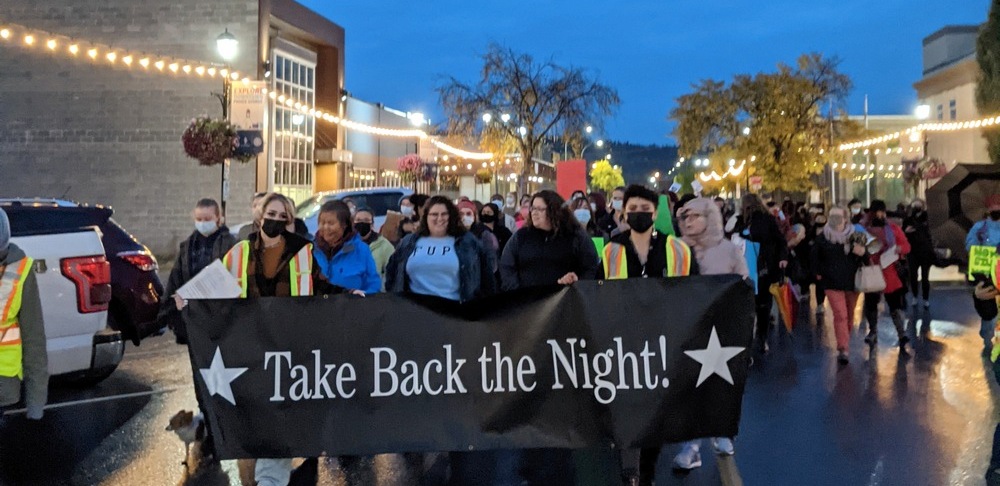
The 30th Annual Take Back the Night march was held in Prince George on September 23 to honour the memory of the women and girls who have not survived violence, to celebrate those who have, and to demand an end to all forms of violence against women and children.
Gathering at the Canada Games Plaza, participants received a warm welcome from Lheidli T’enneh Elder Edith Frederick followed by Dawn Hemingway, University of Northern British Columbia (UNBC) professor and member of the Take Back the Night Organizing Committee, who highlighted the importance of working together, raising our collective voices and empowering ourselves to bring about the change we seek — creating a community and society free from violence. Poet and UNBC professor, Dr. Si Transken then shared a compelling five-part poem written especially for the occasion, followed by remarks from Prince George Mayor, Lyn Hall.
A powerful performance by the Khast’an Drummers launched the march through the streets of Prince George which included a stop at the Courthouse for a moment of silence. Organizers declared that “women should be able to walk down the streets of our city safely — and on our own — and we intend to do just that.” Expressing this sentiment, chants echoed through the streets: Women Unite — Take Back the Night! Women United Will Never be Defeated! Wherever We Go, However We Dress — No Means No and Yes Means Yes! Many local residents and organizations shared this sentiment and came together to sponsor and organize this successful event.
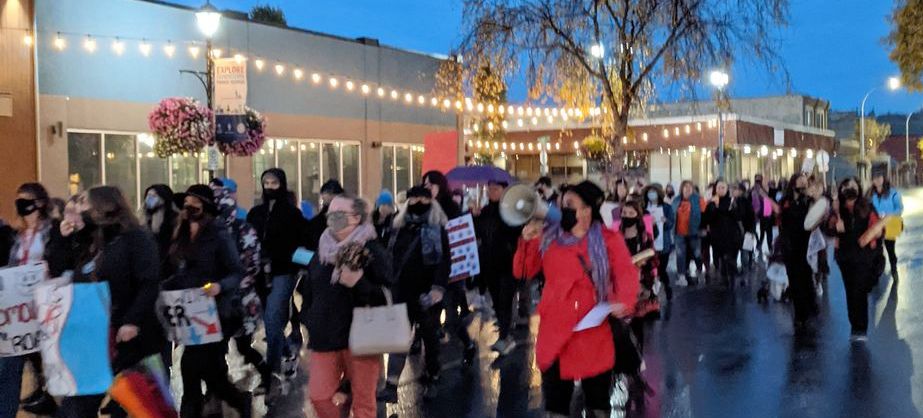
(Photos: RU.)
(To access articles individually click on the black headline.)
Send your articles, photographs, reports, views and comments to editormlpc@cpcml.ca


